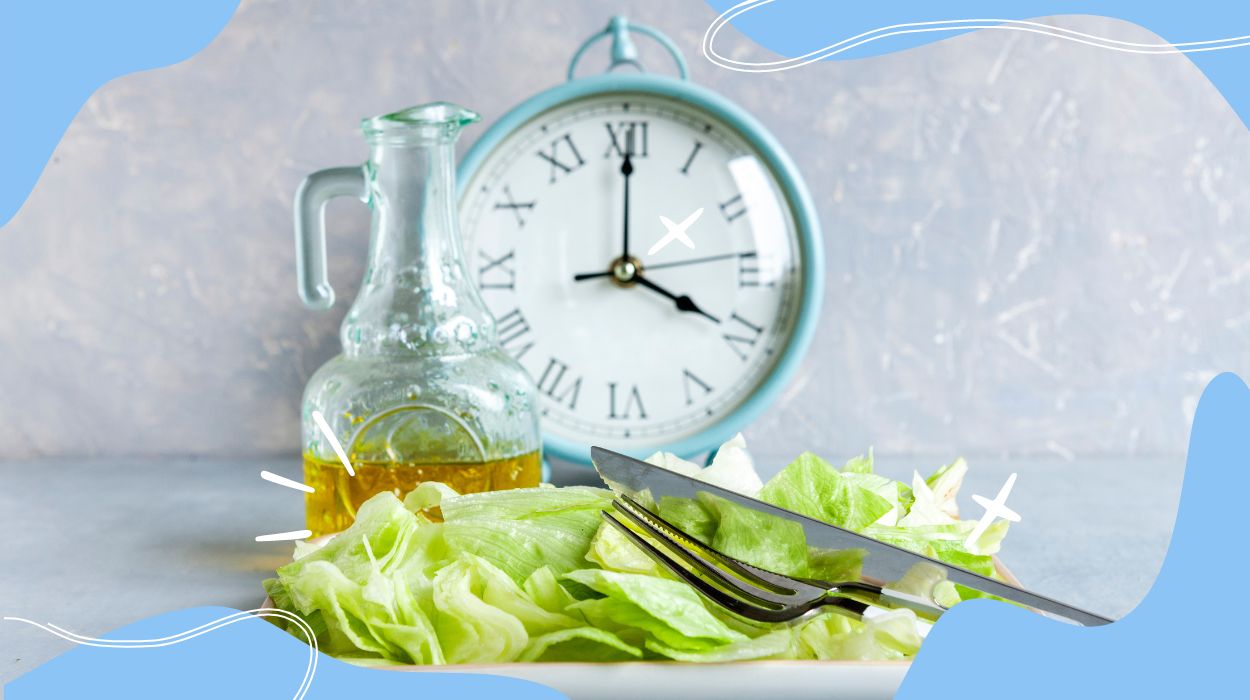 Expert's opinion
Expert's opinion
Expert's opinion
The article is a subjective view on this topic written by writers specializing in medical writing.
It may reflect on a personal journey surrounding struggles with an illness or medical condition, involve product comparisons, diet considerations, or other health-related opinions.
Although the view is entirely that of the writer, it is based on academic experiences and scientific research they have conducted; it is fact-checked by a team of degreed medical experts, and validated by sources attached to the article.
The numbers in parenthesis (1,2,3) will take you to clickable links to related scientific papers.
Intermittent Fasting Headache: Causes & How To Avoid In 2024

Intermittent fasting (IF) has many health benefits, such as boosting metabolism to lose weight. It has become increasingly popular for its promises of improved health. However, intermittent fasting headaches are common side effects of this diet.
IF may help your body improve insulin sensitivity and cellular repair and promote disease protection and longevity. Whether intentional or not, when you skip a meal, it may lead to an intermittent fasting headache. Fasting is often reported by patients and cited as a headache trigger in medical textbooks.
Intermittent fasting disrupts your internal system which regulates and maintains stability, and they are more common in those already prone to headaches. These types of headaches are classified as secondary. These are headaches known to be caused by a specific trigger of some sort, which is fasting in this case.
They are diffuse, affect the frontal region of the head, and usually occur after the 12-hour fasting mark. Sometimes, there is a headache after eating, but usually eating cures this side effect of fasting.
What Causes An Intermittent Fasting Headache?
Not everyone will get an intermittent fasting headache. It is a common and minor side effect that typically occurs within the first 16-72 hours[1] and should resolve after consuming food. They may last for a few days, and they are more likely to occur with prolonged fasting.
IF is a powerful stressor. A fasting headache indicates that something may be wrong, and it may suggest that you are being too aggressive in your intermittent fasting regimen. Sometimes these headaches may also lead to brain fog.
One of the most common causes of an IF headache is dehydration. However, it can also be caused by low blood sugar levels, caffeine withdrawal, nicotine withdrawal, stress, fatigue, emotional and physical discomfort, and muscle tension.
Why Do You Get Headaches While Fasting?
Dehydration
Approximately 20-30%[2] of your water intake comes from food. Dehydration causes the tissues to shrink, putting pressure on nerves in your head and causing a headache.
Also, it is vital to balance the amount of water in your body so that your cells can move nutrients in and out effectively and that your nerves, muscles, heart, and brain can work properly.
An electrolyte imbalance can also cause headaches.
Hypoglycemia
Changes in blood sugar[3] levels can also cause a fasting headache. It does this because the lack of glucose affects the pain receptors in the brain.
Hunger is a signal from your body that you need to eat a meal to provide more calories. Low blood sugar means your brain, which uses 25% of your total sugar, is not getting enough energy from glucose in food.
The brain will get fuel from ketones instead, causing headaches in some people. If intermittent fasting for fat burning[4] is your goal, you must be fasting long enough for your blood sugar and insulin levels to drop, which can lead to headaches.
Caffeine Withdrawal
Caffeine withdrawal[5] can also cause intermittent fasting headaches. Caffeine intake changes the blood flow to the brain. This is because caffeine constricts blood vessels, so with decreased caffeine intake, there is increased blood flow to the brain, leading to a headache.
Stress
Stress changes the body’s ability to release stress hormones such as cortisol[6]. This is another potential cause of intermittent fasting headaches.
The body increases the release of the hormones epinephrine and norepinephrine during intermittent fasting. This can lead to poor sleep and insomnia, leading to a fasting headache.
Muscle tension can also lead to fasting headaches. This may be due to increased histamine[7] release. Histamines can also lead to fatigue. When you are IF, there is less serotonin production which can cause a fasting headache.
How To Avoid Headaches During Intermittent Fasting?
Ultimately, the cure for intermittent fasting headaches is to break the fast. Don’t be too aggressive with your fasting. You may need to take it slow and ease up on your regimen.
You may also consider extending your feeding window if you’re experiencing frequent headaches.
There are some other essential things to consider when trying to maintain homeostasis[8].
Hydration
Up to 60%[9] of the human body is made up of water. Drinking water is essential[10] for maintaining homeostasis. When you are intermittent fasting, it is crucial to drink more fluids so that you stay hydrated, especially during your intermittent fasting windows.
Be careful though, because drinking too much plain water can cause an electrolyte imbalance.
Electrolytes
Drinking fluids that are enhanced with electrolytes[11] is vital. When electrolytes such as potassium, sodium, and magnesium are off-balance, it can lead to intermittent fasting headaches. Therefore, you may need to drink an electrolyte supplement.
Diet
Another way to cure an IF headache is to reduce the number of carbohydrates consumed in your last eating window. Carbohydrates are simple sugars such as rice, bread, pasta, and fruits. Instead, eat fatty fish, seeds and nuts, avocados, eggs, and proteins such as chicken, pork, beef, tofu, beans, and lentils.
Typically about 4 hours[12] after eating your blood sugar levels drop, causing your intermittent fasting headaches.
Lessen Caffeine Intake
Wean your body off of caffeine instead of quitting cold turkey. This may help to avoid IF headaches as your body adapts.
Lifestyle Modifications
Other things that help cure IF headaches are getting plenty of sleep, rest, and relaxation and not overdoing it on exercise. It may also be helpful to incorporate a mindfulness practice such as meditation or yoga.
Although it is not always possible to know the exact cause of a fasting headache, ensuring these things will undoubtedly help make intermittent fasting more enjoyable.
To decrease some of the unwanted side effects of intermittent fasting, you may want to switch to a plan that allows you to eat a meal daily within a specific window.
Ways To Master Your Intermittent Fasting Lifestyle
Whether you are a beginner or advanced at intermittent fasting, there is always room for improvement.
Be sure to drink at least two liters of water a day. Sometimes people may add lime, lemon, or even cucumber to their water to make it more refreshing. Black coffee is popular during fasting, although it’s important to not overdo it on caffeine.
Drinking something like bone broth is also an excellent way to balance electrolytes, and liquids in general help to fight off hunger.
During your eating window, make every calorie count. Select nutrient-dense foods rich in protein, fiber, and healthy fats. When not in your fasting period, eat plenty of fiber, vitamins, minerals, and other nutrients to help keep your blood sugar levels steady and prevent nutrient deficiencies. If you are practicing intermittent fasting for weight loss, many supplements may be helpful.
Be sure to consult with your healthcare professional before starting an intermittent fasting schedule to determine what’s best for you and if you need to adjust any of your medications.
+ 12 sources
Health Canal avoids using tertiary references. We have strict sourcing guidelines and rely on peer-reviewed studies, academic researches from medical associations and institutions. To ensure the accuracy of articles in Health Canal, you can read more about the editorial process here
- The International Classification of Headache Disorders, 3rd edition (beta version). Cephalalgia. 2013;33(9):629-808. doi:10.1177/0333102413485658
- Guelinckx, I., Tavoularis, G., Jürgen König, Morin, C., Hakam Gharbi and Gandy, J. (2016). Contribution of Water from Food and Fluids to Total Water Intake: Analysis of a French and UK Population Surveys. [online] 8(10), pp.630–630. doi:https://doi.org/10.3390/nu8100630.
- Turgay Dalkara and Kıvılcım Kılıç (2013). How Does Fasting Trigger Migraine? A Hypothesis. [online] 17(10). doi:https://doi.org/10.1007/s11916-013-0368-1.
- Olson, B., Marks, D.L. and Grossberg, A.J. (2020). Diverging metabolic programmes and behaviours during states of starvation, protein malnutrition, and cachexia. [online] 11(6), pp.1429–1446. doi:https://doi.org/10.1002/jcsm.12630.
- Sajadi-Ernazarova, K.R., Anderson, J., Aayush Dhakal and Hamilton, R.J. (2022). Caffeine Withdrawal. [online] Nih.gov. Available at: https://www.ncbi.nlm.nih.gov/books/NBK430790/ [Accessed 26 Jul. 2023].
- Bo Hye Kim, Joo, Y., Min Seon Kim, Han Kyoung Choe, Tong, Q. and Kwon, O. (2021). Effects of Intermittent Fasting on the Circulating Levels and Circadian Rhythms of Hormones. [online] 36(4), pp.745–756. doi:https://doi.org/10.3803/enm.2021.405.
- Misto, A., Provensi, G., Vozella, V., Maria Beatrice Passani and Piomelli, D. (2019). Mast Cell-Derived Histamine Regulates Liver Ketogenesis via Oleoylethanolamide Signaling. [online] 29(1), pp.91-102.e5. doi:https://doi.org/10.1016/j.cmet.2018.09.014.
- Torelli, P. and Gian Camillo Manzoni (2010). Fasting Headache. [online] 14(4), pp.284–291. doi:https://doi.org/10.1007/s11916-010-0119-5.
- Usgs.gov. (2019). The Water in You: Water and the Human Body | U.S. Geological Survey. [online] Available at: https://www.usgs.gov/special-topics/water-science-school/science/water-you-water-and-human-body#overview [Accessed 26 Jul. 2023].
- Raucci, U., Boni, A., Evangelisti, M., Nicoletta Della Vecchia, Velardi, M., Ursitti, F., Gianluca Terrin, Giovanni Di Nardo, Reale, A., Villani, A. and Parisi, P. (2021). Lifestyle Modifications to Help Prevent Headache at a Developmental Age. [online] 11. doi:https://doi.org/10.3389/fneur.2020.618375.
- Medlineplus.gov. (2016). Fluid and Electrolyte Balance. [online] Available at: https://medlineplus.gov/fluidandelectrolytebalance.html [Accessed 26 Jul. 2023].
- Borkum, J.M. (2015). Migraine Triggers and Oxidative Stress: A Narrative Review and Synthesis. [online] 56(1), pp.12–35. doi:https://doi.org/10.1111/head.12725.



